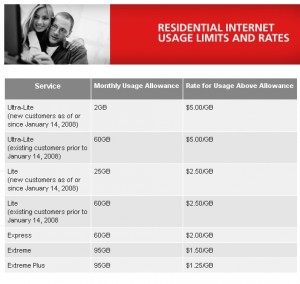CRTC Review of the Internet Traffic Management Practices of Internet Service Providers
July 6 — July 14, 2009
Conference Centre – Outaouais Room
140, Promenade du Portage
Gatineau, Province du Québec
Canada
<
p style=”text-align: center;”>—
The CRTC hearings are being held to establish guidelines on practices that internet service providers use to manage traffic and congestion on their networks. Among the issues under consideration: reducing the speeds of certain Internet applications such as peer-to-peer traffic, establishing usage allowances and/or limits on usage, and whether such practices potentially favor existing providers by protecting their other businesses from competition.
Hearing Transcripts
The official written transcripts of the CRTC hearing proceedings, primarily in English, released by the Canadian Radio-television Telecommunications Commission.
July 6, 2009 — CRTC Web Document
July 7, 2009 — CRTC Web Document
July 8, 2009 — CRTC Web Document
July 9, 2009 — CRTC Web Document
July 10, 2009 — CRTC Web Document
July 13, 2009 — CRTC Web Document
July 14, 2009 — CRTC Web Document
<
p style=”text-align: left;”>
Hearing Audio
Unfortunately, audio from the session of July 6 is not available at this time. Please consult the official written transcripts provided above. Also, hearings in Canada often feature speakers that switch fluidly between English and French when delivering testimony or answering questions. The vast majority of the hearing was conducted in English. On July 13th, there was some extended testimony delivered in French. Some Bell employees flipped back and forth between English and French during their testimony as well. Therefore, for those who are not bilingual, we have included a special audio file recorded from the simultaneous English translation feed on that day.
July 7, 2009
<
p style=”text-align: center;”>CRTC Hearing: Day Two – Morning & Afternoon Session — Gatineau, PQ – July 7, 2009 (207 minutes)
You must remain on this page to hear the clip, or you can download the clip and listen later.
<
p style=”text-align: center;”>
July 8, 2009
<
p style=”text-align: center;”>CRTC Hearing: Day Three – Morning Session (Part 1) — Gatineau, PQ – July 8, 2009 (57 minutes)
You must remain on this page to hear the clip, or you can download the clip and listen later.
<
p style=”text-align: center;”>
<
p style=”text-align: center;”>CRTC Hearing: Day Three – Morning Session (Part 2) — Gatineau, PQ – July 8, 2009 (42 minutes)
You must remain on this page to hear the clip, or you can download the clip and listen later.
<
p style=”text-align: center;”>
<
p style=”text-align: center;”>CRTC Hearing: Day Three – Afternoon Session (Part 3) — Gatineau, PQ – July 8, 2009 (25 minutes)
You must remain on this page to hear the clip, or you can download the clip and listen later.
<
p style=”text-align: center;”>
<
p style=”text-align: center;”>CRTC Hearing: Day Three – Afternoon Session (Part 4) — Gatineau, PQ – July 8, 2009 (78 minutes)
You must remain on this page to hear the clip, or you can download the clip and listen later.
<
p style=”text-align: center;”>
July 9, 2009
<
p style=”text-align: center;”>CRTC Hearing: Day Four – Morning Session (Part 1) — Gatineau, PQ – July 9, 2009 (68 minutes)
You must remain on this page to hear the clip, or you can download the clip and listen later.
<
p style=”text-align: center;”>
<
p style=”text-align: center;”>CRTC Hearing: Day Four – Morning Session (Part 2) — Gatineau, PQ – July 9, 2009 (56 minutes)
You must remain on this page to hear the clip, or you can download the clip and listen later.
<
p style=”text-align: center;”>
<
p style=”text-align: center;”>CRTC Hearing: Day Four – Afternoon Session (Part 3) — Gatineau, PQ – July 9, 2009 (37 minutes)
You must remain on this page to hear the clip, or you can download the clip and listen later.
<
p style=”text-align: center;”>
<
p style=”text-align: center;”>CRTC Hearing: Day Four – Afternoon Session (Part 4) — Gatineau, PQ – July 9, 2009 (48 minutes)
You must remain on this page to hear the clip, or you can download the clip and listen later.
<
p style=”text-align: center;”>
July 10, 2009
<
p style=”text-align: center;”>CRTC Hearing: Day Four – Morning Session (Part 1) — Gatineau, PQ – July 10, 2009 (73 minutes)
You must remain on this page to hear the clip, or you can download the clip and listen later.
<
p style=”text-align: center;”>
<
p style=”text-align: center;”>CRTC Hearing: Day Four – Morning Session (Part 2) — Gatineau, PQ – July 10, 2009 (41 minutes)
You must remain on this page to hear the clip, or you can download the clip and listen later.
<
p style=”text-align: center;”>
<
p style=”text-align: center;”>CRTC Hearing: Day Four – Afternoon Session (Part 3) — Gatineau, PQ – July 10, 2009 (29 minutes)
You must remain on this page to hear the clip, or you can download the clip and listen later.
<
p style=”text-align: center;”>
July 13, 2009
<
p style=”text-align: center;”>CRTC Hearing: Day Five – English Translation Feed — Gatineau, PQ – July 13, 2009 (281 minutes)
You must remain on this page to hear the clip, or you can download the clip and listen later.
<
p style=”text-align: center;”>
<
p style=”text-align: center;”>CRTC Hearing: Day Five – Morning Session (Part 1) — Gatineau, PQ – July 13, 2009 (33 minutes)
You must remain on this page to hear the clip, or you can download the clip and listen later.
<
p style=”text-align: center;”>
<
p style=”text-align: center;”>CRTC Hearing: Day Five – Morning Session (Part 2) — Gatineau, PQ – July 13, 2009 (91 minutes)
You must remain on this page to hear the clip, or you can download the clip and listen later.
<
p style=”text-align: center;”>
<
p style=”text-align: center;”>CRTC Hearing: Day Five – Afternoon Session (Part 3) — Gatineau, PQ – July 13, 2009 (66 minutes)
You must remain on this page to hear the clip, or you can download the clip and listen later.
<
p style=”text-align: center;”>
<
p style=”text-align: center;”>CRTC Hearing: Day Five – Afternoon Session (Part 4) — Gatineau, PQ – July 13, 2009 (67 minutes)
You must remain on this page to hear the clip, or you can download the clip and listen later.
<
p style=”text-align: center;”>
July 14, 2009
<
p style=”text-align: center;”>CRTC Hearing: Day Six – Morning & Afternoon Session — Gatineau, PQ – July 14, 2009 (159 minutes)
You must remain on this page to hear the clip, or you can download the clip and listen later.
<
p style=”text-align: center;”>
Recordings courtesy of: “Bonkers”


 Subscribe
Subscribe



